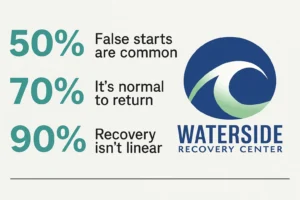You left before it felt finished. Maybe you ghosted. Maybe you sent a quick cancellation email and never followed up. Maybe life just happened, and one missed session turned into a silent goodbye.
Now here you are, months—or maybe just weeks—later, thinking about it again.
If you’ve ever wondered “Can I even go back?”, the answer is yes. Absolutely.
False starts are normal. Coming back to care isn’t about fixing a mistake—it’s about recognizing the moment when you’re more ready than you were the first time.
At Waterside Recovery’s outpatient treatment program, we understand that healing rarely happens in a straight line. We welcome people back all the time—with no shame, no lectures, and no expectation that you explain everything perfectly.
You don’t have to start over from scratch. You just have to start again.
A False Start Doesn’t Mean You Failed
You might be carrying a quiet voice in your head that says: “If I couldn’t finish it last time, what makes this time different?”
Let’s challenge that. Leaving early doesn’t make you a failure. It makes you human.
Maybe you left because:
- You weren’t ready to face everything that came up.
- Life outside of treatment demanded more than you could juggle.
- The program felt overwhelming, or not the right fit.
- Something in your gut said “not now.”
That doesn’t mean it was pointless. It means you took a step—and now you’re thinking about taking another. That’s growth.
False starts aren’t detours. They’re part of the path.
What Didn’t Work Last Time? (It’s Okay to Say It)
Before you return, it helps to pause and get honest about what didn’t feel right the first time.
Ask yourself:
- Was I overwhelmed by the structure or schedule?
- Did I feel unseen or misunderstood in group sessions?
- Was I struggling with childcare, work, or transportation?
- Did I feel unsure about sobriety or change in general?
The truth is, outpatient treatment isn’t one-size-fits-all. And if something didn’t work for you, that doesn’t mean you were the problem.
It just means we need to try a better-fitting version this time around.
You’re Allowed to Change Your Mind (And Your Approach)
Maybe you left because it didn’t feel like the right time. That’s okay.
But now you’re here. Reading this. Which means something has shifted.
Maybe:
- You feel more emotionally open.
- Your stressors have changed.
- You’re more tired of the same cycles than you were before.
- You’re not even sure why—but the thought of trying again keeps nudging you.
Returning doesn’t mean you’re re-doing something wrong. It means you’re revisiting something important—with new eyes and new needs.
How to Ask for a Different Kind of Support
When you reach out, it’s okay to say:
- “Last time I wasn’t ready. Can we talk about what might work better now?”
- “I left early, and I’m nervous about coming back—but I want to try again.”
- “What does rejoining look like if I don’t want to do the exact same track?”
Your care team wants to hear this. We’re not here to plug you into a rigid system. We’re here to help build something sustainable with you.
Maybe that means:
- A slower re-entry with one-on-one support first.
- A different therapist or group setting.
- A daytime track that better fits your schedule.
- A modified plan to help you stay engaged.
Looking for an Outpatient Treatment Program in Plymouth County, MA?
No One’s Mad at You. Really.
This might be the hardest thing to believe. But it’s true.
No one’s holding a grudge. No one’s writing you off. No one is labeling you “noncompliant” behind your back.
Most people in outpatient programs step away at some point. Sometimes once. Sometimes several times. Clinicians expect it. It’s not personal—it’s part of the process.
You don’t need to apologize to come back. You just need to show up now.
Looking for an Outpatient Treatment Program in Bristol County, MA?
What If You Leave Again?
Let’s not pretend this isn’t on your mind.
Maybe part of you is already bracing for another dropout. “What if I leave again? What if I ghost again? What if I can’t stay?”
But maybe this time will be different—not because you promise it will be, but because you know more now:
- You know what didn’t work.
- You know the points where things got hard.
- You know how much not having support hurt more than expected.
Trying again isn’t about proving anything. It’s about choosing support with better clarity.
And if you need to step back again? The door stays open.
How to Start Again (Without Overthinking It)
Here’s your permission slip to keep it simple:
- Call or email and say you’re interested in returning.
- Ask about what’s changed in the program—or what you want to change.
- Be honest about what you need. That’s not weakness. That’s clarity.
- Schedule a brief re-assessment—just to touch base, not start over.
- Go one week at a time. That’s it.
You don’t need to plan your entire recovery. You just need to make one different decision today.
Returning Is a Sign of Strength—Not Starting Over
Let’s flip the script.
You’re not crawling back. You’re not redoing anything. You’re moving forward—with more information, more boundaries, more truth.
Coming back takes more courage than showing up the first time. Because now you know what’s hard—and you’re willing to face it anyway.
You’re not behind. You’re just back. And we’re so glad.
Frequently Asked Questions: Coming Back After Leaving Treatment
Will I have to explain why I left?
No. You’re welcome to share if you want—but there’s no requirement. The goal is to understand what works best for you moving forward, not to revisit the past unless it’s helpful.
Will I be judged for ghosting?
Not at all. Most of our clients leave or pause at some point. We expect that people need space, time, or a reset. You’re always welcome back.
Do I need to redo everything?
Usually not. Your care team will meet with you to understand what you completed, what helped, and what a better fit might look like now.
Can I switch therapists or group tracks?
Yes. If something didn’t feel right last time, we want to explore other options. We offer flexible structures and new entry points for returners.
What if I’m not sure I can stay this time either?
That’s okay. Ambivalence is normal. You don’t have to commit forever. You can commit to a call, a conversation, a few sessions—and we’ll build from there.
I feel embarrassed. Is that normal?
Very. But it doesn’t have to stop you. You’re not the only one who left early. You won’t be the only one who returns. And you absolutely won’t be judged for it.
Feel Like It’s Time to Try Again?
Call (866)671-8620 or visit our Outpatient Treatment Program page to talk through what coming back could look like. We’ll listen. We’ll adjust. And we’ll be glad to welcome you back—with no questions asked unless you want to answer them.
You’re not starting over. You’re starting wiser. And that matters more than anything.



